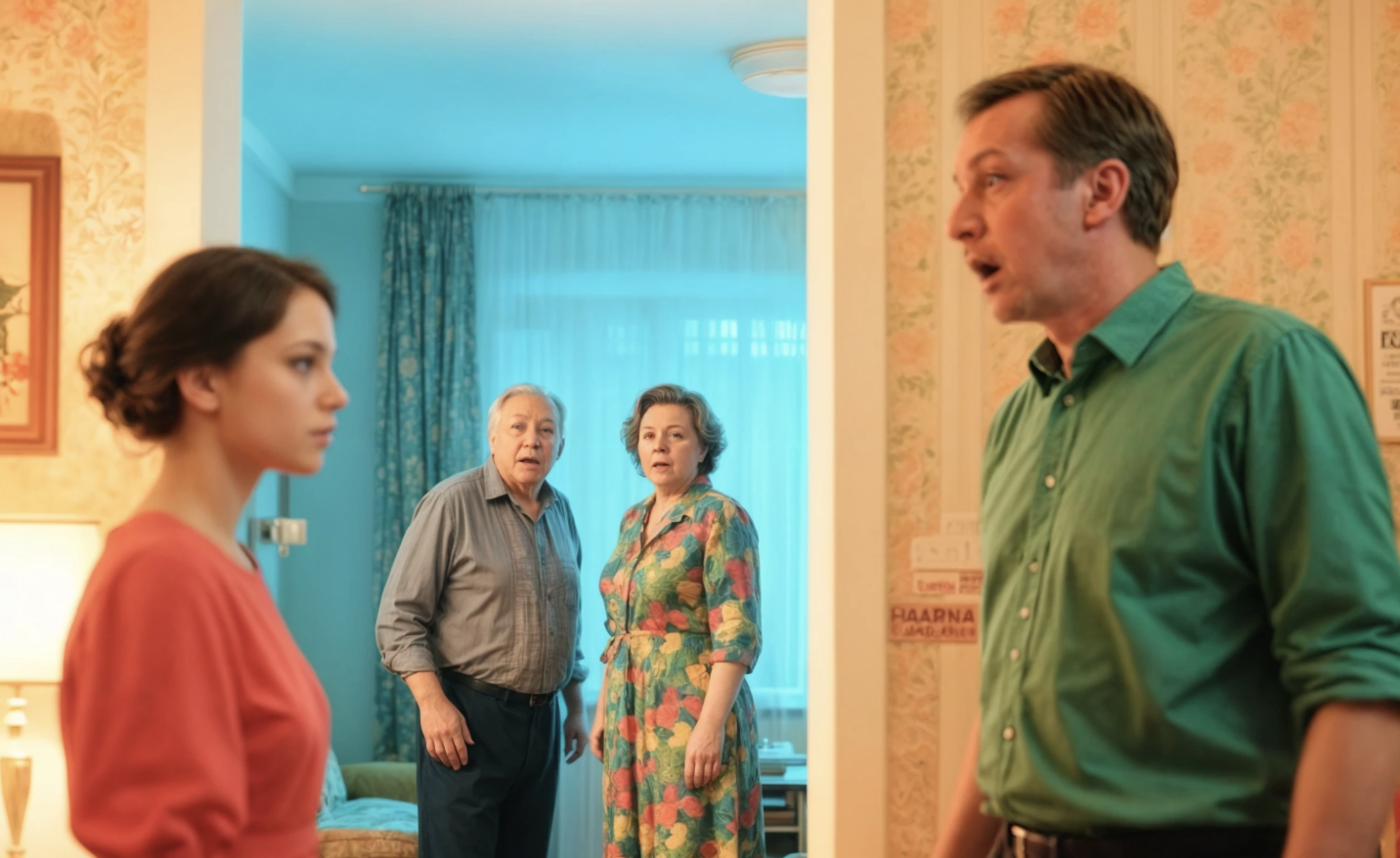The wedding was modest but joyful. Alina, in a white dress bought on sale, radiated happiness, and Dima couldn’t take his eyes off her. Alina’s parents couldn’t come — her father was in the hospital after surgery, and her mother didn’t want to leave him alone. But Dima’s mother, Valentina Petrovna, made a great effort: she set the table, invited relatives, and even hired a photographer.
“Don’t worry, dear,” she said, stroking Alina’s hand at the table, “your parents will still have time to meet our family. The main thing is that you’re now husband and wife.”
Alina nodded and smiled but felt a slight sadness deep inside. She wished so much that her mom and dad were here on this most important day.
The first months of their life together flew by unnoticed. The young couple moved into Dima’s room in Valentina Petrovna’s three-room apartment. The room was small but cozy — Dima had furnished it to his taste back in university. Alina carefully added her things, trying not to disturb the established order.
Valentina Petrovna worked as a chief accountant; she was used to order and a strict routine. She was the first to get up in the morning, prepared breakfast, then went to work. In the evening, she expected Alina to help with dinner and cleaning.
“You’re the lady of the house now,” she told her daughter-in-law with a friendly smile, “you need to learn how to run a home.”
Alina was learning. She was an elementary school teacher, working at a nearby school, and after lessons hurried home to prepare dinner and clean. Dima worked as a programmer and often stayed late at the office, so household chores mostly fell on Alina’s shoulders.
“We’re saving for an apartment,” he explained to Alina when she complained of fatigue. “Another year or two, and we’ll move out. Just hang on a bit.”
By late spring, Alina’s father had recovered, and her parents finally came to visit. Alina was as nervous as before an exam — she wanted everything to go well, for her parents to be liked by Valentina Petrovna, and for her parents to like Valentina Petrovna in return.
Anatoly Ivanovich and Lyudmila Fyodorovna came from a small town three hundred kilometers from the capital. He was a factory locksmith; she was a nurse at a clinic. Simple, hardworking people, but a bit lost in the big city.
“Oh, what an apartment!” Lyudmila Fyodorovna admired as she looked at the spacious living room. “We don’t even have such a two-room place back home.”
“Come in, come in,” Valentina Petrovna greeted the guests with outward warmth, but Alina noticed her shoulders tense. “Make yourselves at home.”
The parents stayed in the living room on the fold-out couch. Lyudmila Fyodorovna immediately offered to help with cooking, but Valentina Petrovna politely declined:
“Thank you, I’ll do it myself. You’re guests, relax.”
During dinner, the conversation was stiff. Anatoly Ivanovich talked about the factory and how hard life was in the provinces, and Valentina Petrovna listened with a polite smile, occasionally nodding. Lyudmila Fyodorovna admired the Moscow metro, stores, and theaters, and every word she said sounded to Valentina Petrovna like a reminder of the difference between their worlds.
“In our town, a new supermarket opened,” Lyudmila Fyodorovna said, “so beautiful! Though the prices sting, the selection is great!”
“Yes, it’s good when there’s a big selection,” Valentina Petrovna replied dryly.
Alina felt the tension rising and tried to keep the conversation going by asking questions to both sides. Dima seemed unaware of the awkwardness and ate calmly.
On the second day, the parents went for a walk around the city while Valentina Petrovna stayed home working on some documents. Alina decided to talk to her:
“Valentina Petrovna, thank you very much for accepting my parents. I know it’s not very convenient…”
“It’s nothing,” her mother-in-law replied without looking up from the papers. “Three days is bearable.”
There was such a chill in her voice that Alina understood it was better not to continue the conversation.
In the evening, when her parents returned from the walk, Lyudmila Fyodorovna brought a bag of groceries to the kitchen.
“I bought cottage cheese, sour cream, thought to make some pancakes. Tolya loves them at home.”
“No need,” Valentina Petrovna said quickly. “I have my own diet plan. Better not to change anything.”
Lyudmila Fyodorovna was confused but silent. Alina saw her mother’s eyes dim, and it hurt her deeply.
On the third day, the parents left. Anatoly Ivanovich hugged his daughter tightly goodbye:
“Live well, daughter. And take care of your husband.”
“Come visit again,” Valentina Petrovna said at the door, but the words sounded more like a formality.
That evening, Valentina Petrovna asked her son to talk to her in the kitchen.
“Dima, I want to be frank with you,” her mother’s tired voice said. “I didn’t really like Alina’s parents. They’re… how to say… too simple. And their enthusiasm about everything… it bothers me. Tell your wife it’s better if they don’t come again.”
Later, when they went to bed, Dima awkwardly spoke to his wife:
“Alin, mom asked me to tell you… She said it’s better if your parents don’t come anymore. She doesn’t really… like them.”
Alina was silent. Inside she boiled with hurt and anger but held herself back.
“I see,” she finally said.
“Oh, come on… Mom doesn’t mean harm. She’s just used to her own order.”
“Dima, I need to tell you something,” Alina turned to her husband. “My parents are selling their apartment. They want to give us the money for the down payment on our apartment.”
“Really?” Dima brightened. “That’s wonderful! We can buy our own place much sooner.”
“Yes, but there’s one condition. While they’re insulating the dacha, they need somewhere to live. They planned to stay here with your mom. The apartment is big; there’s enough room for everyone.”
Dima was silent.
“For a long time?”
“For three or four months. Until the workers get the dacha in order.”
“And then?”
“Then they’ll move to the dacha permanently. And we’ll use their money to buy an apartment and move out from mom’s place. Everyone will be happy.”
Dima sighed heavily. He knew a difficult conversation with his mother awaited.
The next day at dinner, he cautiously started:
“Mom, we have good news. Alina’s parents decided to help us with the apartment. They’re selling theirs and giving us money for the down payment.”
“That’s great,” Valentina Petrovna visibly cheered up. “So you’ll move out sooner.”
“Yes, but… they’ll need to live here temporarily. Until the dacha is fixed.”
Valentina Petrovna’s face changed instantly.
“What do you mean temporarily? How long?”
“Three or four months at most. They’re not just moving in for no reason; they’re helping us get on our feet.”
“Three or four months?” Her voice turned icy. “Dima, are you crazy? I can’t stand strangers in my house for that long!”
“Mom, but they’re not strangers. These are Alina’s parents, your daughter-in-law’s parents.”
“To me, they’re strangers! And I’m not obligated to support them!”
Alina couldn’t hold back:
“Valentina Petrovna, no one is asking you to support them. They’ll buy their own groceries, cook themselves…”
“Don’t interfere!” her mother-in-law snapped. “I’m talking to my son.”
“But they’re my parents!”
“In my house, I decide who lives here and who doesn’t. And I said no.”
“Mom,” Dima tried to find a compromise, “let’s think it over. It really benefits everyone. They help us with money; we move out faster; you stay alone in the apartment…”
“I said no, and that’s final.”
Valentina Petrovna got up from the table and went to her room, slamming the door loudly.
Alina sat with her head down. Tears dropped right into her half-eaten soup.
“What am I supposed to tell my parents now?” she whispered. “They already found a buyer for their apartment, arranged for relatives to oversee the workers…”
Dima was silent, confused. He loved his mother but knew she was wrong. At the same time, he did not dare openly oppose her.
“Maybe we could rent them a place temporarily?” he finally suggested.
“For what? We don’t have extra money; we’re saving ourselves.”
“Let’s ask mom for a loan.”
Alina smiled bitterly.
“After a conversation like that? She’ll kick us out at the door.”
The following days the atmosphere in the apartment was heavy. Valentina Petrovna pretended nothing happened but barely spoke to Alina. Dima rushed between wife and mother, trying to find a solution.
Eventually, Alina had to call her parents and explain the situation. Lyudmila Fyodorovna was upset but didn’t show it:
“It’s okay, daughter, we’ll figure something out. Maybe someone we know has a place to stay temporarily.”
“Mom, I’ll rent you a place,” Alina said firmly.
“Alinochka, why such expenses? We’ll manage ourselves.”
“No, mom. It’s my fault this happened.”
Her parents arrived in June. Alina met them alone at the new rented apartment on the outskirts.
“The apartment is nice,” her mother said, inspecting the rental. “Clean, bright. Enough for me and dad.”
“Mom, I’m so embarrassed…”
“Don’t worry, daughter. We understand. A mother-in-law is a mother-in-law. The main thing is that you and Dima are happy.”
But Alina didn’t feel happy. At Valentina Petrovna’s apartment, relations grew colder. The mother-in-law was outwardly polite, but every word was tinged with dissatisfaction. She hadn’t forgiven her daughter-in-law for daring to insist on her parents living there.
Dima tried to smooth things over, but it didn’t go well. He didn’t understand why the two closest women in his life couldn’t find common ground.
“Mom’s just used to living alone,” he excused his mother to his wife. “It’s hard for her to share space.”
“Dima, she barely accepted my parents as guests,” Alina replied. “And now she acts as if I owe her something.”
“You don’t owe her. But mom wasn’t obliged to let us stay after the wedding either.”
“Maybe we should have rented an apartment right away?”
“Maybe that would have been better.”
These talks led nowhere, only worsening the couple’s relationship.
By autumn, the dacha was ready for permanent living. The parents moved there and soon gave Alina and Dima the money from selling the apartment — enough for a down payment on a small new-build apartment.
“Just choose a good apartment,” Anatoly Ivanovich advised. “So the grandchildren have a place to play.”
Alina smiled. They weren’t thinking about children yet; first, they wanted to settle down and get on their feet.
Finding an apartment took several weeks. Finally, they found a suitable one — a cozy apartment on the second floor of a nine-story building in a good area. Bright, warm, with a convenient layout.
When all the documents were signed and they received the keys, Alina felt immense relief. At last, they would have their own home where they didn’t have to answer to anyone and could live as they pleased.
Valentina Petrovna met the news of the young couple’s move with outward calm, but Alina noticed her lips tighten. The mother-in-law hadn’t expected everything to happen so quickly.
“Well then,” she said at dinner, “finally I’ll be alone in my apartment. Maybe now there will be order.”
Dima winced at her tone but said nothing.
The move was quick — the young couple didn’t have many things. Alina packed her books, clothes, small trinkets that made the room cozy, feeling a strange mix of joy and sadness. Joy because finally they would live in their own home. Sadness because the relationship with Valentina Petrovna remained tense.
“Mom, we’ll visit often,” Dima said when saying goodbye to his mother. “And you come to see us.”
“Of course, son,” Valentina Petrovna replied, but her voice was dry.
Alina went to say goodbye:
“Valentina Petrovna, thank you for everything. For accepting me into the family, for helping us at the start of married life.”
The mother-in-law nodded but didn’t reach out her hand.
“Live well.”
In the new apartment, Alina felt like in a fairy tale. She could cook what she liked, invite whoever she wanted without worrying about anyone’s opinion. Dima also blossomed — he no longer felt torn between his wife and mother, no longer felt constant tension.
Alina’s parents often came to visit. Lyudmila Fyodorovna helped her daughter set up the home, Anatoly Ivanovich built shelves, fixed faucets, hung pictures. They were happy to see their daughter in her own home.
“How about your mother-in-law?” her mother sometimes asked. “Do you talk?”
“Rarely,” Alina answered honestly. “We invite her on holidays, but she usually refuses. Says she’s busy.”
“Such a pity,” sighed Lyudmila Fyodorovna. “Family is family after all.”
Dima did visit his mother regularly, but the relationship between daughter-in-law and mother-in-law remained cold. For Valentina Petrovna’s birthday, Alina made a cake and bought a nice gift, but the mother-in-law received them with obvious indifference.
“I don’t understand what she wants from me,” Alina complained to her husband. “I haven’t done anything wrong.”
“Mom thinks because of your parents, her house was a mess,” Dima explained. “And that you were disrespectful to her.”
“Disrespectful? When?”
“When you insisted your parents live here.”
“Dima, we explained — it would have been beneficial for everyone!”
“Mom doesn’t see it that way.”
Alina waved it off. She was tired of these explanations and attempts to improve relations with her mother-in-law.
Soon Alina found out she was pregnant. The news delighted everyone — Dima and her parents. Valentina Petrovna was also happy, but reserved.
“Finally,” she said to her son. “I was beginning to think I’d never have grandchildren.”
The pregnancy went smoothly. Alina kept working; Dima cared for her even more. Her parents came every weekend, helping prepare the baby’s room.
Valentina Petrovna also began visiting more often. She bought baby things, asked about Alina’s health, gave advice. Alina felt the ice between them gradually melting.
“You know,” she once told Dima, “I think your mother is starting to accept me.”
“She’s just worried about the grandson,” her husband replied. “And about you too.”
Their son was born on a cold February morning. Small, beautiful, resembling his father. Dima couldn’t take his eyes off the baby, and Alina felt such happiness she could embrace the whole world.
The first relative to visit them in the maternity hospital was Valentina Petrovna. She brought a huge bouquet of flowers and a box of expensive chocolates.
“How are you, dear?” she asked Alina, genuine care in her voice. “How do you feel?”
“Good, Valentina Petrovna. Tired but happy.”
“And the baby is so beautiful!” the mother-in-law leaned over the crib. “Just like Dima as a child.”
“Yes, he looks like him,” Alina agreed.
“Listen,” Valentina Petrovna said unexpectedly, “I want to apologize to you. For being… well, not very kind to your parents. And to you too.”
Alina looked at her mother-in-law in surprise.
“I was just used to living alone after my husband died,” she continued. “It was hard to share my home with anyone else. But now I understand — family is family. And your parents are our family too.”
“Valentina Petrovna…”
“Let’s forget all the bad things, okay? We have a grandson now, and we must be a united family. For his sake.”
Alina nodded, feeling tears well up.
“All right. Let’s forget.”
When Alina and her son were discharged from the hospital, the whole family gathered in their apartment. Lyudmila Fyodorovna helped the daughter-in-law care for the baby, Anatoly Ivanovich built a beautiful crib, and Valentina Petrovna… for the first time in a long while, smiled sincerely.
“What shall we name the grandson?” she asked, rocking the baby.
“Yegor,” said Alina. “Yegor Dmitrievich.”
“A beautiful name,” approved the mother-in-law. “A strong name.”
That evening, when the guests left, Dima hugged his wife.
“See, everything worked out. Mom finally realized she was wrong.”
“Yes,” Alina agreed, looking at their sleeping son. “Maybe grandchildren really do work miracles.”
Because little Yegor truly became the bridge connecting the two banks of one river — two generations of one family.



